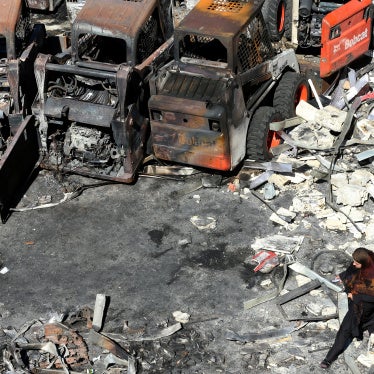The Iranian government has responded to a strike planned by Tehran’s bus drivers for January 28 by preemptively detaining hundreds of drivers, including several union organizers, Human Rights Watch said today. Most of the workers remain in detention without charge or access to counsel. Human Rights Watch called on the Iranian government to release them immediately.
The bus drivers, members of the Union of Workers of the Tehran and Suburbs Bus Company, had organized the strike to protest the detention of their union leader, Mansour Ossanlu, and to demand recognition of their trade union activities.
“Iran’s new government boasts of representing the interests of working men and women. Their violent crackdown on the bus workers’ union make these words ring hollow,” said Sarah Leah Whitson, executive director of the Middle East and North Africa division at Human Rights Watch.
The police detained Ossanlu, the director of the Union of Workers of the Tehran and Suburbs Bus Company, at his home on December 22. Iranian security agents have since held him, without charge or access to his lawyers, at ward 209 of Tehran’s notorious Evin Prison. Ossanlu is reportedly suffering from a serious eye complaint and is in need of urgent medical attention.
Shortly after news of the planned strike in response to Ossanlu’s detention, the government launched a crackdown against the union’s leadership. Gholamreza Mirzaii, the union’s spokesman, told Human Rights Watch that on January 26, security and intelligence agents arrested the union’s board of directors to disrupt the planned strike. Mirzaii said that he himself fears arrest by the authorities at any time.
The security forces also launched a pre-dawn raid on the home of Yaghub Salimi, another member of the union, on January 28. Salimi was not home at the time, but the authorities detained his wife and two children, along with the wives of two other union officials and three of their children, during the raid.
Salimi, in interviews with media outlets outside of Iran, has stated that security forces beat and intimidated his wife and children, and that his 2-year-old daughter sustained facial injuries as a result of her arrest. Authorities released his family members after Salimi presented himself to the authorities.
On the day of the planned strike, security and intelligence agents identified and detained hundreds of union sympathizers when they showed up for work in the morning. According to Mirzaii, the security and intelligence forces beat and physically intimidated the workers in connection with the arrests.
Mirzaii told Human Rights Watch that although the union has not been able to compile exact numbers, it believes that police detained more than 500 workers, who are being held in Evin Prison without charge. He said that the authorities released a small number of detainees on Sunday and Monday, though they have not been allowed to return to work and company officials have threatened to fire them.
As a party to the International Covenant on Civil and Political Rights, the Iranian government is obligated to guarantee freedom of association, “including the right to form and join trade unions.” Article 26 of the Iranian Constitution permits “the formation of parties, societies, political or professional associations.” The right to strike is recognized by Iran’s Labor Law. Article 142 of this law states that in case of a dispute between workers and employers resulting “in the stoppage of work while workers are present in the workplace or in deliberate reduction of production by the workers,” a mediation board shall investigate the dispute.
The Union of Workers of the Tehran and Suburbs Bus Company was founded in 1969, but has been inactive since 1979. The bus workers resumed their trade union activities in 2004. However, the government has refused to recognize the union.
Human Rights Watch called on the Iranian government to stop its persecution of workers and their families, not to retaliate against the workers, and to guarantee their safe return to work.








